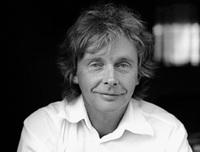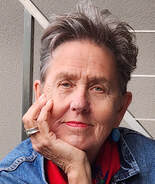Steve Braunias couldn’t have devised a more Braunian setting into which to invite 23 hopeful scribblers for a workshop on writing nonfiction. The man specialises in writing “fascinating - and sometimes disturbing – stories … about people … their lives, loves, aspirations, and dark secrets” in small-town New Zealand. The Motueka Municipal Band Hall is so quintessentially Braunain that it’s hard to escape the feeling that it’s all a sly joke which he’s playing at our expense.

The Spartan kitchen is full of slightly despairing notes. “Please check Hot Tap is turned OFF” asks the note curled damply above the sink. The note on the fridge begs “Please. Please Do NOT Turn this fridge off at the wall. Leave fridge on and door closed, or it will start to smell & go mouldy”.
A note taped in the foyer hints at dark internecine rivalry “This blue vacuum cleaner belongs to the Pipe Band Hall” it reads,”NOT BRASS: DO NOT put in the Storeroom. Thank you.”
Braunias couldn’t have devised a more Braunian setting into which to invite 23 hopeful scribblers for a workshop on writing nonfiction. After all, he specialises in writing about small town New Zealand, most recently in “Civilisation” which contains, according to his publisher, “fascinating - and sometimes disturbing – stories … about people … their lives, loves, aspirations, and dark secrets” in small-town New Zealand. The place is so quintessentially Braunain that it’s hard to escape the feeling that it’s all a sly joke which he’s playing at our expense.
Braunias has an impish grin which he deploys frequently and small hands. He treads the migrainous carpet in soft-soled shoes, wearing thoroughly lived-in clothes: a V-neck jumper that’s almost the same soft grey colour as his hair and which is completely worn through on one elbow, a blue and grey checked shirt and rumpled khaki trousers.
He begins the workshop by introducing himself with self-deprecating charm, explaining how he was turned down for journalism school on his first attempt. And, how he only squeaked in on the second try because a more preferred candidate was struck with glandular fever.
Braunias generously invites us to think of ourselves as professional writers, welcoming us all into the fold before he has read a single word we have written. The writing life creates “enormous self-doubt and anxiety” he warns us, therefore we must all be kind, enthusiastic and generous to each other.
Next, Braunias lists his writing rules on the white-board. It’s a short list. No exclamation marks. No brackets (if you need them you’re probably just gas-bagging). No using the word “whilst”. He’s not too keen on “Anyway” or “So” used to link sentences. But it’s OK to start a sentence with “But”. Or “Or”. Having got the rules out of the way Braunias expounds on the craft of writing non-fiction. “Story is the God we worship here” he says “but stories are based on information, so first you need to gather the information”. The facts must then be presented accurately and coherently. Complexity must be “simplified and compressed to distil the essence”. You must also entertain.
Braunias is in the middle of explaining the particular demands of writing for radio - “it’s like writing haiku” - when on the stroke of ten, he produces a small transistor radio. There’s something wizardly about the flourish with which he sets the radio, popping and crackling with static, on a desk and invites us to listen to the ten o’clock news. The little Japanese squawker must be at least 35 years old. Braunias’ delight in this ancient piece of technology is all of a piece with his advice that we should always carry a HB110 pencil, a pencil sharpener, and a Warwick 3B1 notebook. Though Braunias claims to use a recorder when he’s interviewing, it’s difficult to imagine him utilising anything more modern than a giant reel-to-reel tape recorder.
Dark moments occur after lunch. Braunias distributes a piece of journalism by American writer Lillian Hellman. He’s a big fan. He loves the gift she has for “mercilessly observing”. He finds it “exhilarating to think of Hellman being there and writing it all down”. Someone makes a mildly critical remark about the work. Braunais is suddenly furious. “If you’ve got the arrogance to criticise Lillian Hellman writing at the height of her powers … you go right ahead! But what the f..k!” I wonder if he’s heard of Mary McCarthy’s scathing criticism of Heller - "every word she writes is a lie, including 'and' and 'the'” but this is not the time to mention it.
Later, a woman in the front row innocently trips the same hidden nerve. She suggests that we each read our own work to the class. It’s not an unreasonable suggestion: I’m not the only one who writes their first draft in hieroglyphics and Braunias has found many pieces of work difficult to decipher. “Oh!” he says cuttingly, “So you’re running the class now?” and immediately pretends to sink his attention into the papers in his hand. The woman who made the suggestion waits for a moment before shrugging and announcing to the empty air in front of her “Well … I guess that’s a “no” then”.
But then the sun comes out again. The dark shadow vanishes. The warm and generous Braunais reappears. For the rest of the workshop he engages kindly with each participant in turn, quizzing them on their aspirations, gently rebuking an “ungainly sentence” here, and praising a “natural comedic talent” or an “original voice” there. “Let your work -breathe a bit more” he suggests to several of us. “Ah, that sounds good” he says “Sometimes we just like the way the words sound”.
 RSS Feed
RSS Feed

